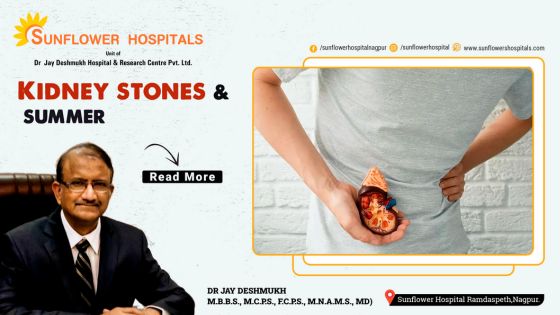What are the symptoms of kidney stones?
Severe sudden pain in the sides of your abdomen radiating to the groin is the common presentation. The pain may come from the back to the front and can be sharp and shooting. Red-colored urine due to blood, frequent urination or burning sensation, fever and chills are the most common presentation. This may be associated with nausea and vomiting.
What are kidney stones?
They are small, hard deposits of minerals and other materials. Many stones in kidney go unnoticed unless they go from the kidney to the ureter. The ureter is a small tube that connects the kidney to the urinary bladder. When the stone blocks the ureter it leads to intense pain and other symptoms. The size may vary from a few millimeters to the size of a lemon.
What are the different types of kidney stones?
Calcium oxalate is the commonest. Calcium phosphate, Uric acid, Struvite, and Cysteine stones are also kidney stones. About 70 to 80% of calcium stones are made with calcium and oxalates. Oxalate comes from the liver and foods like spinach. High vitamin C or D, surgeries, and disorders can raise their levels in urine.
What about other stones?
Calcium phosphate stones are common in those with metabolic disorders or migraine medications. Struvite stones form after urinary tract infections and can grow quickly with few symptoms or warning signs. Uric acid stones develop due to fluid loss from chronic diarrhea, malabsorption, high-protein diets, gout, or genetic factors.
How to prevent kidney stones?
Nearly 50% of people who have developed kidney stones will have a recurrence in the next 10 years. They need to take certain steps to prevent recurrence. This includes a combination of lifestyle changes and medications.
Should calcium supplements be stopped?
Calcium in food in fact can lower the risk of kidney stones. Calcium supplements may be avoided if you have had kidney stones. The same applies to Vitamin D supplements.
What are the lifestyle changes?
Drink water throughout the day. The water intake should ensure a urine output of at least 2.5 litres per day.This is the most effective therapy to prevent kidney stones. Please switch to a diet low in oxalates. This includes avoiding spinach, baked potatoes, lentils and navy beans, bran, chocolate, tea and almonds. A diet high in salt and animal protein can increase the risk of kidney stones. A diet low in salt or sodium and high in potassium can reduce the risk of stone formation. Try to prevent urinary tract infections to prevent Struvite stones. Kidney stone formation is specific to each person. Hence, a personalized treatment plan is necessary. This plan should consider what kind of kidney stones you have, possible causes for their formation, and specific steps to prevent them
Author: Dr Jay Deshmukh
Dr Jay Deshmukh is Chief Physician and Director, Sunflower Hospital, Nagpur Honorary Physician to Honorable Governor of Maharashtra and PondicherryCentral. Dr Jay Deshmukh is an M.B.B.S., M.C.P.S., F.C.P.S., M.N.A.M.S., MD From Internal Medicine – Bombay and New Delhi.


